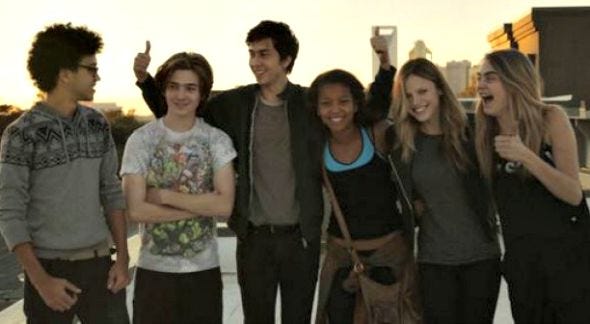Paper Towns

"Paper Towns" is one of those films that starts out well, grows steadily stronger, makes you think it's going one way and then head-fakes in the other. When it reaches its destination it's a refreshing surprise, smarter and subtler than we'd imagined, and yet as we think back on the journey we realize it couldn't have arrived anywhere else without seeming false and forced.
Like last year's "The Fault in Our Stars," also based on a book by Indianapolis author John Green, it is keenly observant of teens not as we would like them to be, but closer to the actual neurotic, self-doubting, self-aggrandizing, glorious young adults they are.
Oops, I used "the words" -- young adult, abbreviated to YA, employed to describe, and often dismiss, an entire sphere of literature. Green is known to despise the term, with some justification.
All I'll say is that these young adult characters are believable, approachable and relatable.
Perhaps that's not a surprise, since the same screenwriting team behind TFIOS, Scott Neustadter and Michael H. Weber, penned this script as well. They also wrote "The Spectacular Now" and "(500) Days of Summer," which, along with the Green movies, pretty much comprises the list of the best films about young people of the last few years.
(I'd add "The Perks of Being a Wallflower," too.)
Nat Wolff plays Quentin, a dweeby band geek and academic overachiever who hasn't really stretched his wings his entire life. He grew up next door to Margo Roth Spiegelman (Cara Delevingne), an adventuress with a zest for mischief and boundary breaking.
But he resisted her siren call, and as their senior year of high school unfolds, she's become the popular wild girl and he's become... rather invisible. He mostly hangs out with fellow nerds Radar (Justice Smith) and Ben (Austin Abrams), commiserating about the suffering existence they can't wait to leave behind.
Then one night Margo shows up at his window, and urges him to join her for an evening of revenge-taking and thrill-seeking.
"Tonight we are righting some wrongs. And wronging some rights. Basically, this is going to be the greatest night of your life," she insists. Margo insists a lot, and people generally go along with it. She also believes in random capitalization within words, lIke tHis, because "it's so unfair to the letters in the middle."
The proceed so have the promised night, which I won't spoil. Quentin is, needless to say, deeply smitten. But then something strange happens: Margo disappears. Days go by, no one has a clue where she is, her parents are used to this sort of nonsense and dismissive. Quentin is left to deal with the consequences of their antics, including Margo's best friend Lacey (Halston Sage), who feels wronged.
They launch an amateur Hardy Boys expedition, seeking out clues the mystery-loving Margo may or may not have left them as to her whereabouts. Eventually Quentin and his two buddies resolve to go on a road trip halfway across the country in search of her. Lacey tags along, as does Radar's girlfriend, Angela (Jaz Sinclair). (This is the sort of movie where even band geeks sometimes have girlfriends.)
None of this makes a terrible lot of sense for smart, ambitious young people who want to go to college and become oncologists and such. But it is good for them to occasionally get out of their comfort zone, especially the self-limiting Quentin.
The title comes from a real thing map-makers did, creating fake towns to prevent forgers from copycatting their work. It's also a knock at Orlando, the place where the characters live and also my own hometown, which often gets dismissed as ersatz and artificial -- usually by tourists who never make it far enough away from Disney and Universal Studios to glimpse O-town's actual downtown. Margo sees paper everywhere, searching for something authentic in life; like Holden Caulfield, she has a tendency to see phonies all about.
Director Jake Schreier, helming his second feature, elicits layered and effusive performances out of his young cast. Wolff is slyly charming, while Delevingne has the unenviable task of having to seem larger than life, and does.
But legends are embellishments of the truth, and in the end "Paper Towns" is more about busting myths than building them up. This is an intelligent, funny, sad yet hopeful take on the folly of waiting for big miracles, instead of creating small ones of our own.
4.5 Yaps



